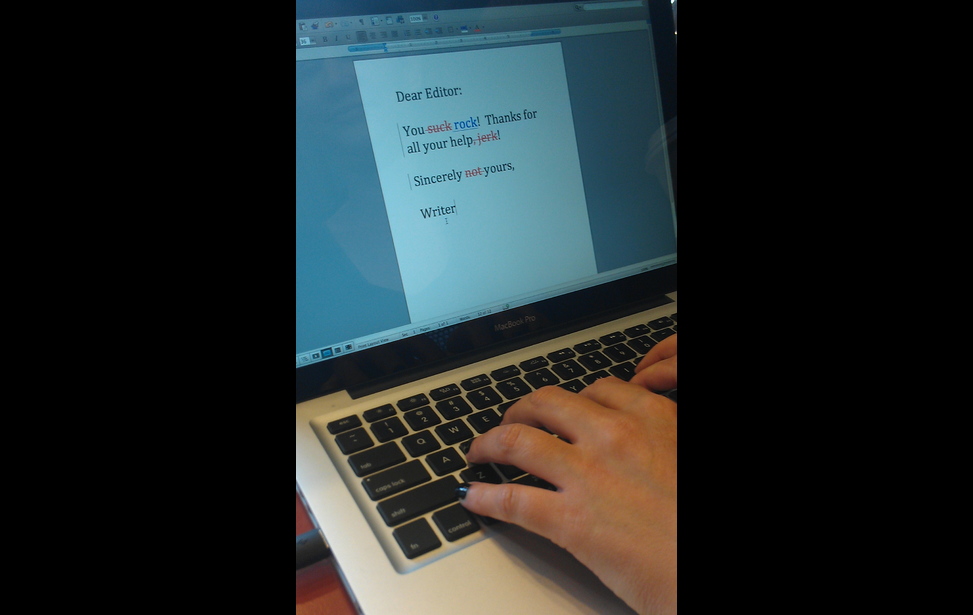50 Shades of Critique
Writers are attached to their novels like a bad romance. It is easy to ignore the flaws because you are caught up in the moment. This is where editors come in—to rescue you. A critique may feel like a slow, torturous death. There is hope, but first you must experience the five stages of grief, in all 50 shades.
Stage One: Ten Shades of Denial
Denial is imminent. The brain becomes overwhelmed with information and shuts down. Defense mechanisms wall up, blocking the ability to hear anything positive. If Stage One happens in-person, stay composed. Smile and keep your mouth shut. Whatever you hear, do not throw a tantrum or sharp objects.
With denial, you will:
Tell yourself your manuscript is perfect.
Point out that famous authors never have to change a word.
Pick apart every comment.
Justify nonessential characters and redundant scenes.
Refuse to make changes, even ones you previously considered.
Question editor’s expertise and agenda.
Call writer friends and whine.
Hang up on writer friends when they agree with editor.
Call non-writer friends and rant some more.
Repeat until you’ve exhausted all your contacts.
Stage Two: Ten Shades of Anger
When you see red, it is important to go somewhere safe, like a locked apartment or animal crate. Do not drive or go near small children. If Stage Two begins immediately after your meeting, find a park bench or coffee shop until anger subsides. Otherwise, you might find yourself lost, aimlessly wandering the streets of a major city.
With anger, you will:
Insist editor is narrow-minded and doesn’t understand your vision.
Blame editor’s inexperience in books with multi-genre categories.
Scoff at editor’s successful publishing history.
Catch contradictions in the critique.
Find prejudice in editor’s suggestions.
Swear editor is trying to write his/her own version.
Claim you chose the wrong editor.
Criticize editor’s upbringing, personal relationships and ideologies.
Flog yourself for wasted time writing a stupid book.
Delete novel word-by-word from your writing program.
Stage Three: Ten Shades of Bargaining
Anxiety will set in. Your “darlings” and ego are at stake. It is imperative not to act on impulse. Hand over your phone and computer to someone you trust so you do not publicize your desperation.
With bargaining, you will:
Transfer backup copy of your novel into your writing program (phew).
Make excuses for your laziness.
Promise to explain confusing parts in the sequel you just decided to write.
Suggest catchier titles.
Ask if you can keep X, Y, and Z if you delete A, but not B. Or C.
Beg for characters’ lives.
Hope point-of-view change from first person to third will solve everything.
Wish you got a bigger advance.
Fantasize about hiring big name writer to co-author.
Promise to be nicer to editor.
Stage Four: Ten Shades of Depression
Your once loved novel will seem hopeless. As much as you will want to be alone in this time of utter despair, surround yourself with writer friends who will supply you with lots of sympathy, praise…and liquor.
With depression, you will:
Realize you’ll never meet editor’s standards.
Admit you have no talent.
Cry.
Use your heavily red-marked pages as tissues.
Discover ten million better books with the same topic as yours.
Wonder why you ever thought your novel was original/brilliant in the first place.
Wail that your plot is so easy your eight-year-old niece figured it out by page two.
See stereotypes and clichés on every page.
Realize you are as hopeless as your characters.
Cry some more.
Stage Five: Ten Shades of Acceptance
Almost in the clear. Now is the time to reconsider the critique and accept that writing is hard work. No exceptions. This is the most important stage, as your novel will die without it. Shut off your phone, hang a “Do Not Disturb” sign on your door and revise, revise, revise.
With acceptance, you will:
Remind yourself that editor has faith in Y-O-U.
Re-read editor’s comments and agree with most of them.
Reconfigure your confusing plot twist.
Realize Character J has no purpose and Kill. Him. Off.
Fall back in love with your book.
Gain confidence in your talent as a writer.
Call writer friends and apologize for the silent treatment since Stage Two.
Thank editor for helping you make your novel the best it can be.
Throw away profanity-filled hate letter to editor.
Write new letter inviting editor to publishing party.
You might jump around, linger on or repeat stages before you succumb to your fate. Like a bad romance, you may wonder why you put yourself through this sadomasochism, time and time again. The payoff is worth it. If you have gotten this far, you have survived the “50 Shades of Critique.” Raise a glass of wine or sparkling grape juice, get back to your computer and write that next novel.
All photos courtesy of Sera Rivers
Photo 1: Fifty Shades of Critique
Photo 2: Dear Editor









